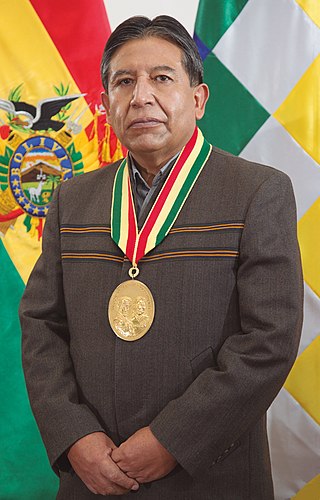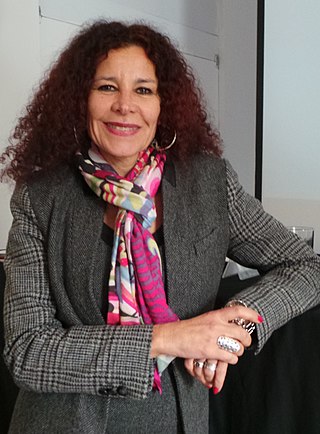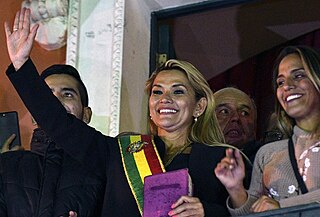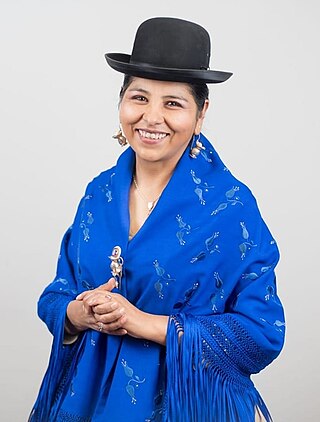Related Research Articles

The politics of Bolivia takes place in a framework of a presidential representative democratic republic, whereby the president is head of state, head of government and head of a diverse multi-party system. Executive power is exercised by the government. Legislative power is vested in both the government and the two chambers of parliament. Both the Judiciary and the electoral branch are independent of the executive and the legislature. After the 2014 Bolivian general election, 53.1% of the seats in national parliament were held by women, a higher proportion of women than that of the population.

Álvaro Marcelo García Linera is a Bolivian politician, sociologist, Marxist theoretician, and former guerilla who served as the 38th vice president of Bolivia from 2006 to 2019. A member of the Movement for Socialism, in the early 1990s he was a leader of the Túpac Katari Guerrilla Army.

David Choquehuanca Céspedes is a Bolivian diplomat, peasant leader, politician, and trade unionist serving as the 39th vice president of Bolivia since 2020. A member of the Movement for Socialism, he previously served as minister of foreign affairs from 2006 to 2017 and as secretary general of ALBA from 2017 to 2019.
María Desiree Durán Morales is a Bolivian model and beauty pageant titleholder who participated in Miss Universe 2006 as Miss Bolivia and made top 10.

Elizabeth Cristina Salguero Carrillo is a Bolivian diplomat, journalist, politician, and women's rights activist who served as minister of cultures from 2011 to 2012. A member of the Movement for Socialism, she previously served as a party-list member of the Chamber of Deputies from La Paz from 2006 to 2009. In 2009, she was elected as a substitute party-list member of the Chamber of Deputies from La Paz but resigned before taking office in order to launch an ultimately unsuccessful La Paz mayoral campaign. From 2012 to 2015, she served as ambassador of Bolivia to Germany, and since then has worked as an international expert in strategic planning at UN Women.
Julia Damiana Ramos Sánchez is a Bolivian nurse and politician. She was a Plurinational deputy from 2006 to 2009, and Minister of Land and Rural Development from 2009 to 2010, during the first government of Evo Morales.
Eliana Paco Paredes is an indigenous Aymara Bolivian fashion designer from La Paz. In 2016, after exhibiting her chola designs at the Bolivia Fashion Week in June, she achieved recognition in New York City, participating in the September fashion week.

Francisca Remedios Loza Alvarado was a Bolivian artisan, television presenter and politician.

Silvia Velarde Pereyra, better known by her stage name, Sibah, is a Bolivian blues and rock and roll singer-songwriter.

Antonia Wilma Alanoca Mamani is a Bolivian journalist, politician, and television presenter who served as minister of cultures and tourism from 2017 to 2019. A member of the Movement for Socialism, she previously served an El Alto municipal councilor from 2015 to 2017, a position she returned to in 2021.

Claudia Fernández Valdivia is a Bolivian commercial engineer and television presenter. Since September 2012, she has been married to Álvaro García Linera, who was Bolivia's vice president from 2006 to 2019.

A political crisis occurred in Bolivia on 10 November 2019, after 21 days of civil protests following the disputed 2019 Bolivian general election in which incumbent President Evo Morales was initially declared the winner. The elections took place after a referendum to amend the Bolivian constitution, which limits the number of terms to two, was rejected in 2016. In 2017, the Constitutional Tribunal (TCP) ruled that all public offices would have no term limits despite what was established in the constitution and allowing Evo Morales to run for a fourth term.

Jeanine Áñez Chávez is a Bolivian lawyer, politician, and television presenter who served as the 66th president of Bolivia from 2019 to 2020. A former member of the Social Democratic Movement, she previously served two terms as senator for Beni from 2015 to 2019 on behalf of the Democratic Unity coalition and from 2010 to 2014 on behalf of the National Convergence alliance. During this time, she served as second vice president of the Senate from 2015 to 2016 and in 2019 and, briefly, was president of the Senate, also in 2019. Before that, she served as a uninominal member of the Constituent Assembly from Beni, representing circumscription 61 from 2006 to 2007 on behalf of the Social Democratic Power alliance.

Martha Yujra Apaza is a Bolivian politician and trade unionist who served as minister of cultures and tourism from 2019 to 2020. A prominent trade union leader in El Alto, Yujra was the only indigenous member of the Jeanine Áñez Cabinet and was the final official to head the Ministry of Cultures and Tourism; the institution was abolished during her term. During her tenure, Yujra's office primarily dealt with the effects of the COVID-19 pandemic on the cultural sector, devising means of alleviating the economic ramifications of quarantine measures on artisans and entertainers. She subsequently served as a counselor at the Embassy of Bolivia in Quito from July to November 2020. Prior to serving as minister, Yujra gained notoriety for her fierce opposition to the government of Evo Morales. In 2017, she led a breakaway faction of the pro-government El Alto Regional Workers' Center. As its executive secretary, Yujra aligned the union with the Bolivia Says No alliance, running unsuccessfully to represent La Paz in the Chamber of Deputies in the annulled 2019 general elections.

Bertha Beatriz Acarapi is a Bolivian politician and former television presenter serving as a party-list member of the Chamber of Deputies from La Paz since 2020. A member of the Movement for Socialism, she previously served as an El Alto municipal councillor from 2000 to 2004 on behalf of the Revolutionary Left Movement and from 2004 to 2010 on behalf of Plan Progress for Bolivia. During her second term, she served as president of the El Alto Municipal Council from 2006 to 2007, becoming the first woman to assume that post. Outside of politics, Acarapi's lengthy career in radio and television journalism led her to join ATB in 2015, becoming one of the country's first high-profile chola indigenous presenters.

Franz Gróver Choque Ulloa is a Bolivian industrial engineer, lawyer, and politician who served as vice minister of employment, civil service, and cooperatives from 2019 to 2020. A member of the Social Democratic Movement, he previously served as a party-list member of the Chamber of Deputies from Oruro from 2010 to 2014 on behalf of the National Convergence alliance and as a member of the Constituent Assembly from Oruro, representing circumscription 32 from 2006 to 2007 on behalf of the Social Democratic Power alliance.

Rhina Aguirre Amézaga was a Bolivian disability activist, politician, and sociologist who served as senator for Tarija from 2010 to 2015.
María Magdalena Cajías de la Vega is a Bolivian academic, historian, and politician who served as minister of education from 2007 to 2008. Cajías spent most of her professional career teaching history at the Higher University of San Andrés, in addition to holding a number of consultancy posts for intergovernmental organizations and government bodies. She authored multiple published historical titles, focusing on the fields of women's and labor history. In 2006, Cajías was brought on as a consultant for the Ministry of the Presidency before being appointed to head the Ministry of Education the following year. After a brief return to academia following the conclusion of her ministerial term, Cajías returned to public administration as consul general in Santiago, where she served from 2014 to 2019. In 2021, she was named as a member of the editorial board of the Bolivian Bicentennial Library.

Lidia Patty Mullisaca is a Bolivian politician and trade unionist. A member of the Movement for Socialism, Patty represented La Paz in the Chamber of Deputies, first as a substitute alongside Manuel Canelas from 2015 to 2018 and later as a voting member until 2020. She later served as consul of Bolivia to Puno, Peru, in June 2023 and has been vice consul of Bolivia in La Plata, Argentina, since September 2023.

Ancelma Perlacios Peralta is a Bolivian cocalera activist, politician, and trade unionist who served as senator for La Paz from 2015 to 2020.
References
Citations
Bibliography
- Aguirre, Liliana (7 November 2014). "Justa Canaviri: 'El golpe en la cara se borra, pero el que te llega al alma no'" (in Spanish). La Paz, Bolivia: La Razón. Archived from the original on 8 December 2016. Retrieved 8 December 2016.
- Avendaño, Alberto (19 August 2015). "La valentía boliviana de "La Justa" estuvo en DC" [The courageous Bolivian "La Justa" was in DC] (in Spanish). Washington, D. C.: El Tiempo Latino. Archived from the original on 9 October 2015. Retrieved 8 December 2016.
- Colanzi, Liliana (17 April 2015). "La rebelión de las cholas" [The rebellion of the cholas] (in Spanish). Madrid, Spain: El País. Archived from the original on 14 December 2015. Retrieved 8 December 2016.
- Linarez, Iblin (27 February 2013). "Justa volvió a Bolivia Tv y no dejará CVC" [Justa returned to Bolivia TV and will not leave CVC] (in Spanish). La Paz, Bolivia: La Razón. Archived from the original on 8 December 2016. Retrieved 8 December 2016.
- Linarez, Iblin (1 February 2013). "Que se frieguen los que no entienden nuestro programa" [Scrub those who do not understand our program] (in Spanish). La Paz, Bolivia: La Razón. Archived from the original on 8 December 2016. Retrieved 8 December 2016.
- "100 Women: Bolivia cholita chef Justa Canaviri on abuse". London, England: BBC. 26 October 2014. Archived from the original on 1 July 2016. Retrieved 8 December 2016.
- "En Bolivia se aviva el orgullo indígena, pero crece tensión étnica" [In Bolivia, indigenous pride is fueled, but ethnic tension grows] (in Spanish). Guayaquil, Ecuador: El Universo. Reuters. 10 February 2008. Archived from the original on 8 December 2016. Retrieved 8 December 2016.
- "Justa Canaviri". Gourmetravel (in Spanish). Santa Cruz de la Sierra, Bolivia: Editorial Sugrey SRL. 2014. Archived from the original on 13 February 2014. Retrieved 8 December 2016.
- "La Cadena BBC Destaca a la Justa" [The BBC Chain Highlights La Justa] (in Spanish). La Paz, Bolivia: La Prensa Bolivia. 29 October 2014. Archived from the original on 8 December 2016. Retrieved 8 December 2016.
- ""La Justa" es Magnífica Dorada" ["La Justa" is Gorgeously Golden] (in Spanish). La Paz, Bolivia: El Diario. 11 December 2014. Archived from the original on 30 March 2016. Retrieved 8 December 2016.
- ""La Justa" se suma a la campaña "Cartas de Mujeres"" ["La Justa" joins the campaign "Letters of Women"] (in Spanish). La Paz, Bolivia: Página Siete. 19 November 2014. Archived from the original on 25 December 2014. Retrieved 8 December 2016.